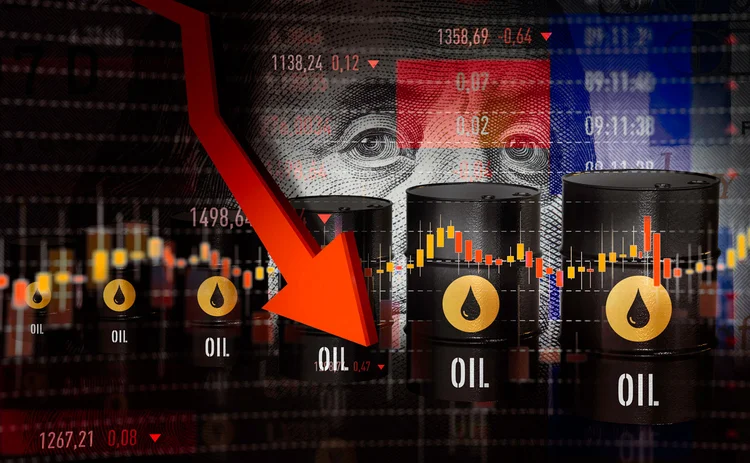
Podcast: Ilia Bouchouev on the future of retail investment in oil
Will negative prices and big losses curb retail investors’ appetite for oil futures over the longer term?

Retail investors have become a dominant force in oil futures, building up significant long positions through tracker funds and other instruments such as exchange-traded funds (ETFs). In April, the biggest of these, United States Oil Fund (USO), held between a quarter and a fifth of the May and June West Texas Intermediate (WTI) futures contracts, before it rolled positions further along the curve to stay in line with the CME’s position limits rules.
In this Energy Risk podcast, Ilia Bouchouev discusses the rise of the retail investor in oil futures and what this means for hedgers. He looks at the extent to which retail investment accentuated the plunge of WTI crude futures into negative territory in April, and whether that episode will curb retail investors’ appetite for buying oil.
In May, Wisdom Tree announced the closure of eight oil tracker funds, while USO’s clearer, RBC Capital, stopped it from taking on additional positions. Bouchouev gives his view on these developments.
Bouchouev is the managing partner at Pentathlon Investments and an adjunct faculty member at New York University, where he teaches energy trading as part of the Mathematics in Finance Master Program. He is the former president of Koch Global Partners and has written extensively on derivatives and energy markets. A particular area of interest for him in recent years has been the role of speculative players in the oil markets.
Index
02:46 The history of speculation – from ripe pickings 15 years ago to the contango and losses of the past decade.
06:18 Has a decade of losses dampened financial investors’ enthusiasm for oil futures?
07:43 When did retail investors start building sizeable positions in oil futures?
09:19 The different motivations of institutional and retail investors.
11:24 How big are retail investors now – what percentage of the market do they hold?
13:46 How was USO able to build up such a large position?
15:40 USO now holds oil in contracts out as far as June 2021. Is this a big departure from its investment objective?
18:30 If speculators move into longer-dated maturities, does this create more liquidity for hedgers?
21:20 A look at what happened on April 20, when prices turned negative.
26.05 What have negative prices meant for retail investors’ appetite for commodity futures?
30:43 If investor products become more sophisticated, should there be more regulation around them?
33:25 What will the closure of the eight Wisdom Tree oil funds and RBC Capital's decision to limit its exposure to USO mean for the market?
36:30 Looking ahead, what impact will retail investment have on oil hedging and the WTI benchmark?
Listen to other podcasts in this series here.
Only users who have a paid subscription or are part of a corporate subscription are able to print or copy content.
To access these options, along with all other subscription benefits, please contact info@risk.net or view our subscription options here: http://subscriptions.risk.net/subscribe
You are currently unable to print this content. Please contact info@risk.net to find out more.
You are currently unable to copy this content. Please contact info@risk.net to find out more.
Copyright Infopro Digital Limited. All rights reserved.
You may share this content using our article tools. Printing this content is for the sole use of the Authorised User (named subscriber), as outlined in our terms and conditions - https://www.infopro-insight.com/terms-conditions/insight-subscriptions/
If you would like to purchase additional rights please email info@risk.net
Copyright Infopro Digital Limited. All rights reserved.
You may share this content using our article tools. Copying this content is for the sole use of the Authorised User (named subscriber), as outlined in our terms and conditions - https://www.infopro-insight.com/terms-conditions/insight-subscriptions/
If you would like to purchase additional rights please email info@risk.net
More on Commodities
Energy Risk 2024 Software Rankings: IT demands increase amid rising risk
Heightened geopolitical and credit risk increase requirements on commodities software
Energy Risk Asia Awards 2023: the winners
Winning firms demonstrate resiliency and robust risk management amid testing times
ION Commodities: addressing the market’s recent pain points
Energy Risk Software Rankings winner’s interview: ION Commodities
Energy Risk Commodity Rankings 2023: adapting to new market dynamics
Winners of the 2023 Commodity Rankings provided reliability when clients faced extreme change
Energy Risk Software Rankings 2023: managing uncertainty
Unpredictable markets make CTRM software choices key
Navigating the volatility and complexity of commodity markets
Commodity markets have experienced significant challenges since the Covid-19 pandemic, the conflict in Ukraine and the subsequent sanctions imposed on Russia. These unprecedented events have caused fluctuations in supply and demand, disrupted global…
Energy Risk Asia Awards 2022
Recognising excellence in energy risk management
Market shrugs off EC’s plan to change gas benchmark
Dutch TTF prices unmoved, as market participants say they are “not taking it seriously”
Most read
- Industry urges focus on initial margin instead of intraday VM
- For a growing number of banks, synthetics are the real deal
- Did Fed’s stress capital buffer blunt CCAR?







